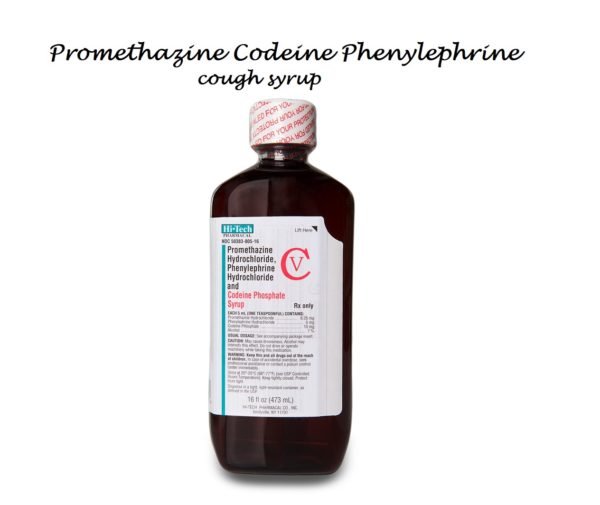Promethazine Codeine Phenylephrine cough syrup is a formulation of three drugs that have anti-allergic, anti-tussive (cough suppressant), analgesic, and anti-emetic properties.
Promethazine Codeine Phenylephrine Cough Syrup Uses:
-
Cough and upper respiratory symptoms:
- It is helpful in relieving cough and upper respiratory symptoms including nasal congestion related allergy or the common cold.
Promethazine codeine phenylephrine Cough Syrup Dose in adults
Promethazine codeine phenylephrine Cough Syrup Dose in adults for the treatment of Dry Cough and Upper respiratory tract symptoms:
- 5 mL per oral every 4 to 6 hours
- Maximum: 30 mL per 24 hours of (codeine 60 mg/promethazine 37.5 mg/phenylephrine 30 mg)
Promethazine codeine phenylephrine Cough Syrup Dose in Children
Promethazine Codeine phenylephrine Dose in children for Cough and upper respiratory symptoms:
Note:
- With increasing adverse effects such as difficulty breathing, addiction, overdose, and death the FDA in January 2018 advised against routine use of codeine, hydrocodone-containing cough, and cold products for patients <18 years and that future manufacturer labeling for these products include a contraindication in this population [Ref]
Promethazine Codeine Phenylephrine Cough Syrup Dose Adjustment as per the Manufacturer's labeling:
- Note: Some manufacturer labeling have shown that certain drugs contraindicated in ages <12 years.
- Oral solution: Each 5 mL of promethazine 6.25 mg, phenylephrine 5, and codeine 10 mg:
-
Children 6 to 11 years:
- 5 to 5 mL every 4 to 6 hours as needed
-
The maximum daily dose:
- 30 mL/24 hours
-
Children ≥12 years and Adolescents:
- 5 mL every four to six hours, up to a daily dose cap of 30 mL/24 hours.
- 5 mL every four to six hours, up to a daily dose cap of 30 mL/24 hours.
-
- Oral solution: Each 5 mL of promethazine 6.25 mg, phenylephrine 5, and codeine 10 mg:
Pregnancy Risk Factor C
- Studies on animal reproduction have not been conducted
- For more information, refer to the individual monographs.
Promethazine Codeine phenylephrine use during breastfeeding:
- Codeine is found in breast milk. However, it is not known if codeine is excreted in breast milk.
- Breastfeeding is encouraged Not recommended Manufacturers can cause serious side effects.
- Talk to individual agents.
Promethazine Codeine phenylephrine Dose adjustment in renal disease:
- There are no dosage adjustments provided in the manufacturer's labeling.
- A reduction of the dose is necessary for renal impairment.
Promethazine Codeine phenylephrine Dose adjustment in liver disease:
- There are no dosage adjustments provided in the manufacturer's labeling.
- Codeine clearance may be reduced in liver disease. Initial dose reduction in significant hepatic impairment is recommended.
Side effects of Promethazine Codeine phenylephrine Cough Syrup:
See individual agents.
Contraindication to Promethazine Codeine phenylephrine Cough Syrup:
Hypersensitivity to promethazine or phenylephrine, codeine or any other phenothiazines are contraindications.
- Children under 12 years
- Adenoid or tonsillectomy patients over the age of 18 are qualified for postoperative care.
- Patients suffering from unconsciousness
- Asthma and lower respiratory tract infections can be treated.
- Hypertension
- Peripheral vascular insufficiency
- Use within two weeks of monoamine oxide inhibitor therapy
There is not much data on the possibility of cross-reactivity between opioids and allergens. Due to similarities in chemical structure/pharmacologic reactions, cross-sensitivity cannot always be excluded.
Warnings and precautions
-
Modified cardiac conduction
- May cause cardiac conduction disruptions that can lead to fatal arrhythmias.
-
Anticholinergic effects
- Possible anticholinergic side effects include constipation, xerostomia and blurred vision.
- Patients with reduced GI motility, urinary retention or benign prostate hypertrophy should not use it.
-
CNS depression:
- Can cause depression of the central nervous system, which can lead to impairments in physical and mental abilities.
- Patients should be cautious when operating machinery/driving.
-
Constipation
- Patients with unstable angina or post-myocardial Ischemia may experience constipation.
-
Extrapyramidal symptoms:
- Extrapyramidal symptoms, such as tardive dyskinesia, acute dystonic reaction, pseudo-parkinsonism and acute dystonic reactions can arise
-
Hypotension
- Might cause severe hypotension (orthostatichypotension/syncope).
- You should use it with caution in hypovolemia, heart disease, and drugs that exaggerate hypotension like general anesthetics.
- Hypotension symptoms should be monitored after dose titration or starting. Patients with circulatory shock should be cautious.
-
Neuroleptic malignant syndrome (NMS):
- To diagnose early neuroleptic malignant syndrome, it is important to monitor for changes in mental status, fever, muscle rigidity and autonomic instability.
-
Phenanthrene hypersensitivity:
- Patients who are hypersensitive to other phenanthrene derivative opioid agonists like hydrocodone, hydromorphone, levorphanol, oxycodone, or oxymorphone should use this medication with caution.
-
Photosensitivity
- Photosensitivity can be caused by drugs. Avoid prolonged sun exposure.
-
Respiratory depression
- Codeine can cause fatal respiratory depression.
- Therapy should include strict monitoring of respiratory depression.
- The effects of opioid-induced respiratory depression on carbon dioxide retention can increase the severity of sedation.
-
Temperature regulation
- It is possible to have impaired body temperature regulation.
- Therefore, it is important to be cautious when engaging in strenuous exercise, heat exposure/dehydration, and taking anticholinergic medication.
-
Conditions abdominales:
- Dose reduction is necessary for patients suffering from acute abdominal conditions.
-
Insufficiency of the adrenals:
- Patients with Addison disease might need to reduce their initial dose.
-
Insufficiency of the biliary tract:
- Patients with acute pancreatitis/biliary tract dysfunction should be cautious. It may cause constriction to the sphincter Oddi.
-
Suppression of bone marrow
- Use with caution in patients with bone marrow suppression/leukopenia and agranulocytosis.
-
Cardiovascular disease
- Patients with arteriosclerosis/cardiovascular disease/poor cerebral or coronary perfusion should be used with caution.
- Reduced cardiac output can be caused by phenylephrine.
-
Delirium tremens:
- Patients with delirium-tremens in alcoholics should be cautious.
-
Diabetes:
- Patients with diabetes mellitus should be cautious.
-
Fever:
- Patients with fever should reduce the dose immediately.
-
GI disease:
- Precautions should be taken with patients who have pyloroduodenal blockage, especially those with stenotic peptic ulcers.
- Patients with IBD should be cautious. Patients with ulcerative colitis should reduce their initial dose.
-
Glaucoma:
- Patients with narrow-angle vision should be cautious.
- A cholinergic blockade can worsen the condition.
-
Genitourinary disease
- Patients with bladder neck obstruction/BPH/urary stricture should be cautious.
- Patients with prostatic hypertrophy need to be reduced in dosage.
-
Head trauma
- Patients with intracranial injuries/ high intracranial pressure/ head injury should be used with extreme caution.
-
Hepatic impairment
- Take care.
- Patients with severe liver impairment should be reduced in doses.
- Promethazine can cause cholestatic jaundice
- Children with hepatic diseases should not use it..
-
Myasthenia gravis:
- Patients with myasthenia Gravis should exercise caution as it could be exacerbated by a blockade of the cholinergic system.
-
Obesity:
- Patients who are severely obese should be taken with caution
-
Parkinson disease
- Patients with Parkinson's disease should be cautious due to the higher risk of tardive dyskinesia.
-
Psychosis:
- Patients with toxic psychosis should be treated with caution.
-
Renal impairment
- Take care.
- Patients with impaired renal function require dose reduction.
-
Respiratory disease
- Use with caution in patients who have COPD or who are at risk for respiratory depression due to hypoventilation, postoperative status, obesity or obstructive sleep apnea, severe pulmonary disease, neuromuscular disease, or combination therapy.
- Patients with asthma shouldn't take this drug.
-
Seizures:
- Patients at high risk of seizures should be used with caution, especially if they have a history of seizures or are combining medications that lower the seizure threshold.
- Patients with convulsive disorders will need to reduce their initial dose.
-
Thyroid disease:
- Patients with thyroid disease should be cautious and reduce their dosage.
Monitoring parameters:
- Symptom relief
- respiratory and mental status
- BP and pulse rate
- signs of misuse and addiction should be noted.
How to administer Promethazine Codeine phenylephrine Cough Syrup?
Administer with an accurate measuring device household teaspoon should not be used as it can cause overdosage.
Mechanism of action of Promethazine, Codeine, and Phenylephrine:
Codeine:
- By binding to opioid receptors within the central nervous system, codeine inhibits ascending pain pathways.
- This alters how people perceive and react to pain. Through direct central action in the medulla, it causes broad central nerve depression and suppresses coughing.
Phenylephrine
- The nasal mucosa is vasoconstricted by phenylephrine.
Promethazine:
- The brain's postsynaptic mesolimbic dopaminergic receptors are blocked by phenothiazine derivative.
- It also exhibits strong alpha-adrenergic blocking effects and suppresses hypothalamic or hypophyseal hormone releases It competes with histamine in the H1 receptor.
- The muscarinic block effect is responsible for anti-emetic activity. It reduces stimuli to brainstem retina system. (See individual agents)
Promethazine, phenylephrine, and codeine Cough Syrup Brand Names (International):
- Promethazine VC/Codeine
Promethazine, phenylephrine, and codeine Cough Syrup Brand Names:
Brands in Pakistan will be updated later.

 Injection for familial chylomicronemia syndrome.jpeg)


